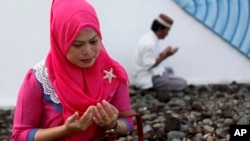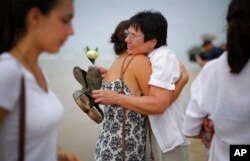Beach side memorials, moments of silence, and religious services were held across Asia Friday to mark the 10th anniversary of the Indian Ocean tsunami that killed at least 220,000 people in 14 countries in 2004.
Outside of the doleful remembrances, experts warned that despite millions of dollars spent on early warning systems, shortcomings remain in the region's disaster preparedness.
The gigantic wave struck a dozen countries around the Indian Ocean rim. It destroyed entire coastal communities, wiped out families and crashed over tourist-filled beaches the morning after Christmas.
The disaster was triggered by a 9.1-magnitude earthquake, the region's most powerful in 40 years. It sent waves roaring across the Indian Ocean at jetliner speeds as far away as East Africa and was so powerful, it caused the Earth’s axis to wobble a few centimeters.
Indonesia was hardest hit, with more than 160,000 dead. Friday in Banda Aceh province, near the tsunami's epicenter, Vice President Jusuf Kalla remembered how the world came together following the tragedy the day after Christmas.
"This commemoration ceremony is not only to pray for the victims and thank the people around the world, but it is a time when we learn how to resolve the problem, as the lesson [from the tsunami] taught us, how to resolve a complicated problem by uniting as one," Kalla said.
Thailand
In Thailand, Prime Minister Prayuth Chanocha led a remembrance ceremony, attended by survivors, relatives and foreign dignitaries. The ceremony was held in the resort area of Khao Lak, next to a police boat that was carried two kilometers inland by the tsunami and has now become a memorial. The service brought together survivors, family members and dignitaries from the 14 foreign countries whose nationals perished.
"I would like to take this opportunity to pay a tribute to the tsunami victims of both Thai and foreign nationals who have lost their lives," said Chanocha. "The great loss at that time is a reminder for everyone to be well prepared for natural disaster and learn how to protect themselves, lessen the damage and losses [in the future], as well as enhance efficient warning system and disaster mitigation efforts."
Some 5,400 people lost their lives in Thailand, including 2,500 Thai nationals. The victims included 534 from Germany and 526 from Sweden. Others came from Finland, Britain, and Switzerland, as well as Australia, Korea, Japan and the United States. Hundreds of Myanmar migrant workers also perished.
Several hundred Swedes also gathered in Khao Lak to pay tribute to their countryment who were killed in Thailand during the tsunami.
Swiss national Katia Paulo was there to honor her late boyfriend, who disappeared on a nearby beach. "I had my back to the ocean. My boyfriend called me. ... The only thing I remember is his face. I knew I had to run away, then the wave caught me," the 45-year-old told the French news agency AFP.
India, Sri Lanka
In India, hundreds of survivors of the tsunami marched through the southern town of Vailankanni, converging at a memorial set up to honor the dead.
And in Sri Lanka, where 1,000 people had been killed when the tsunami’s waves derailed their passenger train, survivors and relatives climbed aboard the restored Ocean Queen Express and rode to the fatal site in Peraliya.
Wanigaratne Karunatilleke, the train’s head guard, told AFP the deaths could have been avoided. "We had about 15 minutes to move the passengers to safety. I could have done it," he said. "We had the time, but not the knowledge."
Sri Lanka had a death toll of 31,000.
Officials also opened an exhibition on the country's early warning system set up after the disaster.
The director of the country's disaster management agency, Major General Gamini Hettiarachchi, said the new early warning system set up across the island nation's coast line has been tested a number of times.
"A lot of resilience has developed. People's skills have been developed," he said. "Drills have been conducted, evacuation drills, last mile evacuations. Committees have been formed. They know that in an emergency we have to get the message immediately."
Disaster goaded change
Many of the regions hit by the tsunami were underdeveloped and struggled to recover from the disaster. Eventually, over $13 billion was collected to help in the relief and reconstruction effort.
The tragedy triggered a massive international effort to put in place early warning systems to reduce the likelihood of such a deadly recurrence. The systems were set up across more than two dozen countries, along with monitoring buoys afloat ready to gauge sea movements.
In the Asia Pacific region, earthquakes and tsunamis have claimed more than 910,000 lives since 1970. But there are fears now of growing complacency among local populations and governments.
Before the 2004 tragedy, Thai meteorologist Samith Dharmasaroja had warned of a potential disaster in the Asia Pacific from an earthquake and tsunami. Now, he said, the early warning systems that were installed have been inadequately maintained.
"Nobody takes any responsibility" to maintain almost 100 warning towers in southwestern Thailand, the meteorologist said.
Thailand’s top forensic scientist, Pornthip Rojanasunand, spent almost six weeks in southern Thailand working on victim identification with teams of international scientists and police. Local police and communities remain inadequately prepared for a future disaster, she said.
"We still can’t cope with that kind of incident – I mean the large scale after the tsunami," she said. "The police still wait. The [forensic] knowledge of this kind of work will gradually disappear. The ones from the tsunami have to rotate and some retire. So in the future, we still have a problem."
More investment, maintenance urged
A sophisticated, $400 million early warning system is in place across 28 countries. But parts of it just don’t work, and the public hasn’t been educated about it.
Shamika Sirimanne, who focuses on disaster risk reduction at the United Nations Economic Commission for Asia and the Pacific, said governments need to spend more to avoid a repeat of the 2004 disaster.
"Take disaster [concerns] into the august halls of finance and planning," she urged, "so that they are aware that there are a huge amount of investments that need to be done. … End-to-end early warning systems need to be put in place. A lot more needs to be done. This is an unfinished agenda."
VOA's Ron Corben contributed to this report from Bangkok. Some additional material was provided by AFP, AP and Reuters.







